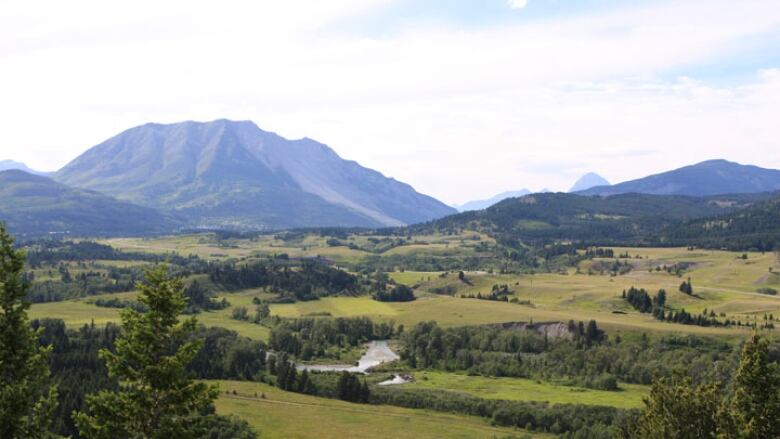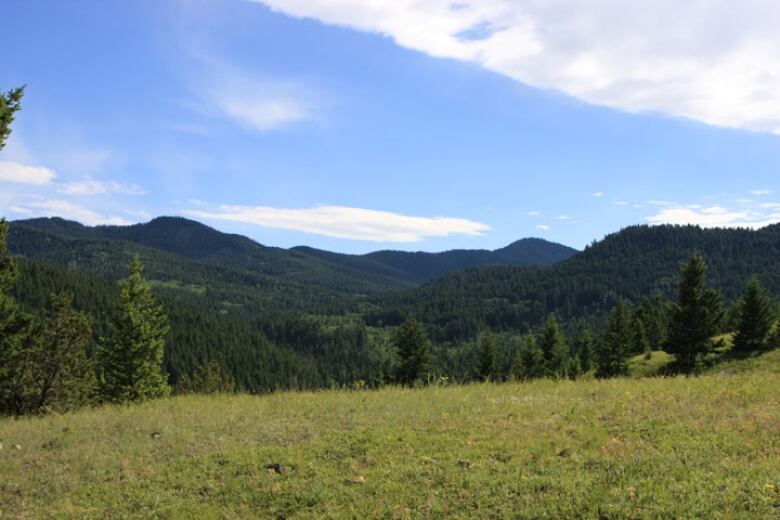Alberta grazing lease program under review
Auditor general's 'bombshell' focuses on ranchers charging for oil and gas access to public property

For more than 100 years there has been an agreement between the Alberta government and its politically powerful ranchers.
They care for more than fivemillion acres ofpublicland in exchange for the right to graze their livestock on it.
In many ways, it wasa good deal for both sides.
The auditor general has really dropped a bombshell into the discussion. -CliffWallis
But over the yearsit's becomea much better deal for the ranchers, because the rent hasn't gone up in more than 20 years andbecause there is oil and natural gas under the Prairie grassland.
The ranchers have been chargingenergy companies to access the public land that they care for, but don't own.
It has been a long-simmeringbut politically impossible problem for Alberta.
Now the province's auditor general has triggered a review of the grazing lease program, and the fight isn't going to be pretty.
"The auditor general has really dropped a bombshell into the discussion," saidCliff Wallis, a board member with the Alberta Wilderness Association.
"We have a real variation of people out on the land, from really good stewards who know what they're doing, who look after the resource, to others who see it as a private fiefdom."
Cowboy welfare?
Critics call itcowboy welfare.
The original leaseholders were granted the grazing rights free. They pay very reasonablerent to the province and taxes to the municipality. Ranchers are responsible for fencing and other upkeep.
The real conflict is around energy development. Ranchers are able to charge energy companies and utilities for access to the public land.
Under current law, if you want to drill a wellor put up a power lineor lay pipeline, you pay the leaseholderfor access to the land.
Therefore grazing leases have become very valuable. Something that was granted freeis now sold on the private real estate market, sometimes for hundreds of dollars per acre.

The lease for the public land in thispicture is for sale. There are 1,134 acres of rangeland thatcan support 166 grazing cattle per month. The leaseholder must maintain the land, fence it, control the weeds and pay the municipal taxes.
The annual lease amount is less than $600, the taxes are less than $700. The asking price for the lease is $265,000. When the lease is sold, the proceeds will go to the selling leaseholder, not the province.
"In my grandfather's time, he only paid the lease fees and taxes and took over the leases," said Pat Rutledge, a leaseholder in southeastern Alberta.
Rutledge has 20,000 acres of land, about half of which is leased and half is owned, or deeded.
"We happen to have two sections that are adjacent to our pasture that the neighbour would like to sell," said Rutledge.
"My daughter made him an offer last winter of $600 an acre for the deeded land and $300 an acre for the leased land, and it wasn't high enough."
Rutledge says he supports an increase in the lease rates paid to the province.
"The Grazing Leaseholders Association has been proposing a different formula that would see lease fees go up over time," said Rutledge, addingthat if lease rates are too low,American cattle producersmightperceive themas a subsidy.
Ranchers and the energy sector
Auditor General MerwanSaherdid say that annual rents are too low, but hewas more focused on compensation from the energy industry.
His report statesthe province doesn't know how many of its leaseshave oil and gas activity on them,nor how much was paid for that access. Saherwas forced to cobble together an estimate through extrapolation.
He obtained public information on 54 grazing associations with around 600,000 acres of public land under lease. According to the report, those associations paid nearly $60,000 in annual rent to the province and collected nearly $350,000 in payments from industry for access to the land.
From that example, Saherestimated the province was forgoing more than $25 million each year that was paid to ranchers for access to public land.
Larry Sears,chairman of the Alberta Grazing Leaseholders Association,points outthat the government still collects royalties on the oil or natural gas being produced. But in the case of leased public land, it doesn't collect the fees paid to access the land to drill in the first place.
"The government gets compensated," saidSears,a rancher in southern Alberta whohas no oil and gas activity on his leases."Theyare the owner of the resource and get royalties;they get more than half of what the grazing leaseholder gets."
Sears questions whetherSaherunderstandsthe issues ranchers face.
"I don't think there's any understanding by either himself, or the politicians, or the general public aboutwhat the leaseholder has to put up with in the way of adverse affects [from oil and gas]."
"There's lots of potential damage to fences, livestock health, livestock death, fire, dust, noise, all of these things that can affect your operation."
Searsalso disputes the $25-million figure, saying the auditor generalis simply making a guess.
Access to the land
Money is not the only issue with grazing leases. Recreational userslike hunters, as well as First Nations peopleand environmentalists, have long bemoaned their lack of access to public lands held under grazing leases.
The leaseholders have to allow reasonable access to the land, but can also deny permission. Online hunting forums are full of discussions about who owns what grazing leases, how likely they are to grant access andwhere the fences can be found.
"We've been doing some work for government and have been disallowed to get on the land to do biological surveys," said Wallis, of the wilderness association.
"We hear those same statements,that we don't understand. I don't think they understand the value of those public lands and how much frustration there is when it comes to getting access."
Political heft
In 1999, the Progressive Conservativegovernment ofPremier Ralph Klein passed a billthat fundamentally changed the way leaseholders were compensated for energy drilling on the Crown land, whichwould have brought Alberta's law closer to those in Saskatchewan and B.C.
In news stories from that time, the estimate was that leaseholderswould be giving up $40 million per year. Larry Sears says that number was never cited by ranchers, and that the grazing leaseholders do not feel the number is anywhere near that high.
The day after the bill passed, Klein was set to attend a Western Premiers' Conference at the Royal Tyrrell Museum in Drumheller, Alta.
The ranching community came outon horsebackto send a message to Klein. They lined the entrance to the museum, holding placards that said Klein was biting the hand that fed him.
Klein didn't turn up, and the protest dispersed. However, the message was received andthe law was never proclaimed, or implemented.
Whether that political heft will hold with Alberta's current NDP government remains to be seen.
The government has promised only to review the program. It hasn't committed to changeit.













_(720p).jpg)


 OFFICIAL HD MUSIC VIDEO.jpg)
.jpg)



























































































